Why Rowing?
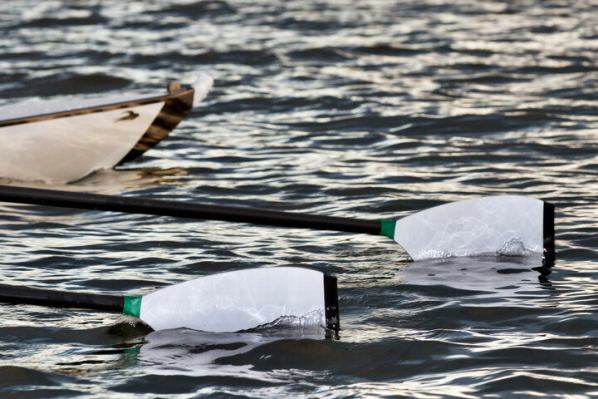 In the world of rowing, different paths converge, each unique journey interwoven with moments of discovery, perseverance, and triumph. For Concept2 employees Oscar Rijneveld (Concept2 Benelux), Martin Stridde (Concept2 Germany), Kate Smith (Concept2 US), Silvan Zehnder (Concept2 Switzerland), Guido Geisler (Concept2 Germany) and Judy Geer (Concept2 US), their introduction to rowing sparked a lifelong affinity that has left a deep mark on their lives.
In the world of rowing, different paths converge, each unique journey interwoven with moments of discovery, perseverance, and triumph. For Concept2 employees Oscar Rijneveld (Concept2 Benelux), Martin Stridde (Concept2 Germany), Kate Smith (Concept2 US), Silvan Zehnder (Concept2 Switzerland), Guido Geisler (Concept2 Germany) and Judy Geer (Concept2 US), their introduction to rowing sparked a lifelong affinity that has left a deep mark on their lives.
What drew you to rowing, and how did you start in the sport?
Oscar
It was during my introductory week at university that I learned about rowing. With three other blokes, I went out to do "something different" and visited the Bosbaan rowing course for an introduction into rowing. After some practice and a 250 meter flat out on the erg (a Gjessing!), then a row in a (very wide) coxed four, I was hooked! Signed up at Nereus Rowing Club in Amsterdam as soon as I could.
Martin
My stepmom was a rower. She got me into a rowing boat in 1982 when I was nine. I was a "keel pig," meaning I was sitting next to the coxswain of the 4+ (coxed four). I have been fascinated by this sport ever since. When I got into high school in Germany, I joined the school's rowing club.
Kate
I went to a boarding school located right on Sippican Harbor in Marion, Massachusetts, and orientation was on the school's schooner, the Tabor Boy. The chaperone on the trip was also the rowing coach, and when she learned I did not have a spring sport, she immediately put the bug in my ear to try out rowing. I was hooked from the first practice.
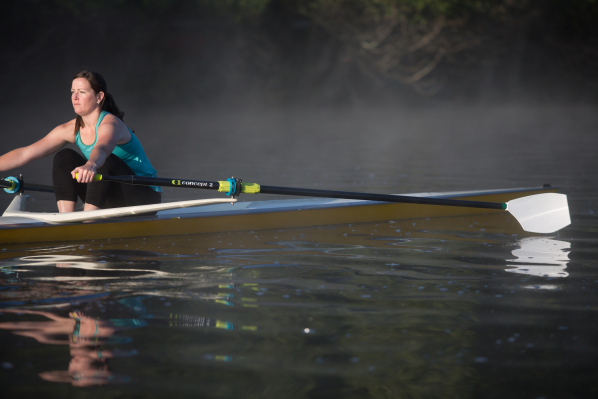
Guido
I started rowing when I was eleven years old. A classmate told me about it and so I went to the rowing club to try it.
Judy
I think I was drawn to rowing because it was new and different, but also felt familiar since I had grown up near water swimming and sailing. I learned to row at the women’s college I attended for my first two years of university. It was “proper rowing for young ladies.” We got points for form as well as speed. We didn’t carry our boats to the water because it wouldn’t have been "ladylike" or we "wouldn’t have been strong enough." So, the boats lived in the water in the boathouse, and we climbed in and rowed them out of the house. But then I transferred to a newly co-ed university, where women’s rowing was just being introduced. I stroked the 8 at the Head Of The Charles® Regatta that first fall and I was hooked.
Reflecting on your early experiences with rowing, can you share a specific moment or event that solidified your passion for the sport?
Oscar
At bow I was really struggling to keep the pace and the rhythm ever since I made it to the freshman 8+. Around midway in a race, I clearly recall trying to change that by putting less effort in the finish and more in the first part of the stroke, sitting more upright at the finish. At that point I mastered the rowing stroke, I think.
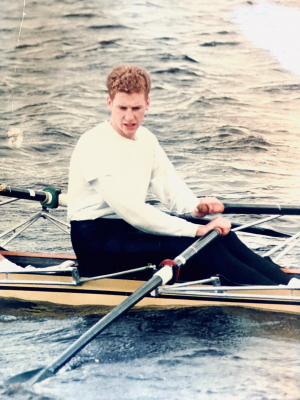
Martin
It was when I spent every afternoon at my rowing club in high school. I just loved it, since I found peace there. My parental home was not great. My mom died when I was four years old, and my father and my stepmother were fighting a lot.
Kate
When I was a junior in high school, I decided to try out for the Junior National Team the following summer. It required a commitment to winter training along with my basketball training, so I would go to the boathouse alone at night or early in the mornings to complete the erg work. I knew then that if I had the determination to train for two sports at once, then something about rowing had me hooked.
Silvan
One time in winter the lake was nearly frozen and the snow was laying on the lake. The lake was literally covered in snow. I rowed a pair with Mario Gyr, and the sound when rowing through the snow was like cutting through a sand dune. It was amazing!
Guido
It was the community that existed in the club and the cohesion that kept me in the club.
Judy
As graduation approached, I realized that I was not going to “grow up” and stop rowing. I was enjoying rowing so much that I was not going to stop. I continued to work for a professor and train with the Dartmouth program. It was then that the coach suggested I try out for the 1976 Olympic Team. I wasn’t sure he was serious, but I started to think about it, and got more and more serious.
Rowing is a physically demanding and mentally challenging sport. What kept you motivated during the most difficult periods of training?
Oscar
Team spirit. Never wanting to let my teammates down. That’s what always kept me going when it was tough. And boy, I suffered. I was such a wimp coming out of high school. My fitness level and mental skills were far behind my teammates. But I made up for it.
Martin
It was the camaraderie and the belief that I could always do better.
Kate
Lots of loud music and the after parties!
Silvan
The numbers! The numbers showing that I was improving! If I’m improving, I know that all the suffering is worth it, because if I were to go only the speed I was going a few months back, then it wouldn’t even be demanding anymore—so obviously I wanted to suffer. The only way to get even better numbers!
Guido
My comrades had to do the same training and we motivated each other to keep going.
Judy
I think I just loved the challenge of it, and the camaraderie of facing the challenge with friends. I’d never been particularly good at field/ball sports, but I had trained as a swimmer for years, and naturally knew how to push myself in training.
Are there significant rowing milestones or achievements that stand out to you? How did these moments shape your perspective on the sport?
Oscar
There are so many memories. Here is one: It was a 6k race in the pair in stone cold, snowy conditions. It's already 2k from the boathouse to the finish, so we had an 8k warm-up in total. Far from ideal in those conditions. The week prior to the race, I got a new teammate and had to change side, so I moved from stroke to bow. We only did two workouts in this seating.
The entire time to the start we feared a horrible race and discussed not starting at all. We were so slow in the warm up that by the time we reached the start, the umpire made us turn around and start our race at once. This race was doomed to fail for us. However, as of the very first race stroke, the boat was perfectly steady and after five strokes, the boat speed was immense. The contrast couldn't have been bigger to our warm-up. We finished 5th (out of many) and smashed our teammates that started two minutes in front of us. Only the pairs that formed the National 8 were in front of us. Never give up.
Martin
I was never a super successful rower on a national scale. However, I won my very first race in a single at a school regatta. And I also won the most school regattas. Later, when I was 17 years old and returned from a yearlong exchange program in the US, I decided to row competitively. I was living in a small town one hour away from Hamburg. To get the proper training, I had to commute. So, after school, I went on the train, drove to Hamburg, trained, and took the train back. My father bought me a Model B Indoor Rower to train on when I could not participate in the training in Hamburg.
Kate My best memories of rowing were in college in the fall when we trained with our pair partner in the 2- on a beautiful stretch of the Androscoggin River in Maine. The peace and serenity of small boats stayed with me even during the big boat hustle.
Silvan
After not qualifying for the 2008 Olympics, I struggled with my life because I was a very one-dimensional person at that point. Not having achieved the goal of my life left me to question the reason for my existence. This was obviously dangerous, and I realized that, while rowing is awesome, it cannot be the sole reason for my existence.
Judy
My most significant achievements are my three Olympic teams, ’76, ’80, and ’84. Interestingly, the ’80 Olympics never really happened for US athletes due to boycotting Russia. This was a lesson in itself and added to my perspective on sport. For one thing, I saw sport as a form of positive diplomacy, a way to connect with athletes from other countries—but alas, we weren’t given the chance. Secondly, I realized that I rowed for more than just making the Olympic team. I rowed because I loved the sport, loved the training, loved the places it took me and the friends that I made. You really must enjoy the process, because you never know when a pandemic, or a boycott, or sickness will prevent you from reaching your end goal.
Rowing often involves teamwork and collaboration. How did these aspects influence your rowing experience? How have the skills you learned influenced you later in life?
Oscar
Team: The whole is more than the sum of its parts. A team carries many characters, not necessarily those you would pick as friends. You don't need be friends to work well together and achieve your goals. You have to be respectful to others, accept differences and create a safe environment for discussion. I’ve lived with this ever since.
Martin
Being on time, for example, is something I have learned. Overcoming obstacles, coping with painful situations, and carrying on are other qualities I learned during my rowing training.
Kate
I think the need to balance grit and grace while in a boat has translated into my life in many meaningful ways. The humble, quiet and internal fight required for rowing has also translated into how I carry myself through the world as I wear the many hats that make me, me: A steadfast friend and partner, a fierce mama bear and a loyal employee.
Silvan
An eight is always faster than a single. No matter how good you think you are, if you have teammates you’ll always perform better—in any situation in life. In an eight, everyone wants to go fast. They may row a bit differently, but everyone wants to go fast. Same in life! The people around you all want to progress or improve—maybe in another way as to how you think is correct—but they absolutely want to improve, go faster, be more successful.
Guido
I have often observed that no matter where someone comes from, they have the same goal in the community and are helped without question, be it rowing or the activities surrounding rowing.
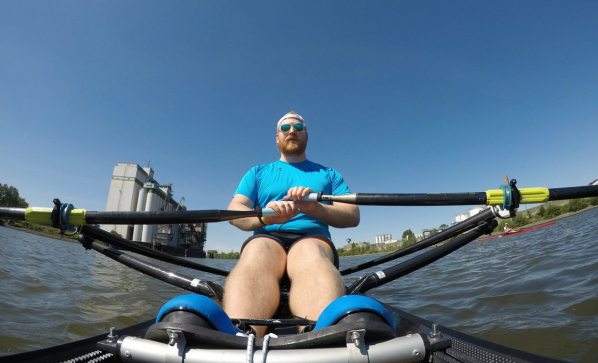
Judy
I spent a lot of time in team boats, and I also spent a lot of time in a single. In a team boat you must rely on the honest work of your teammates, which builds a strong shared respect. In a single, you learn to take responsibility for all of it—good or bad. Both of these situations certainly apply to the real world, and the other sorts of work that happens there.
What was/is your favorite part of the sport?
Oscar
I love racing. It gives me a goal.
Martin
The camaraderie and the physical aspects.
Kate
I love that moment right after you cross the line, either on the water or in a boat, when you are both mentally and physically spent yet full of hope and pride that you made it happen.
Silvan
Easy stroke rate of 40! The absolute best part of rowing is when you’re fit and skilled and can just chill mid race at a stroke rate of 40! The peak of life experience!
Guido
Sometimes it's the socializing. But it's often very relieving to be able to escape from everyday life.
Judy
I think I’d say that the ongoing training and process of enjoying the sport is what I loved most. Also, the environment in which one rows—the water. Being on the water is calming (most of the time) and lovely. Early mornings in the fog. Sunrises and sunsets. But going fast and winning races is of course also really fun!
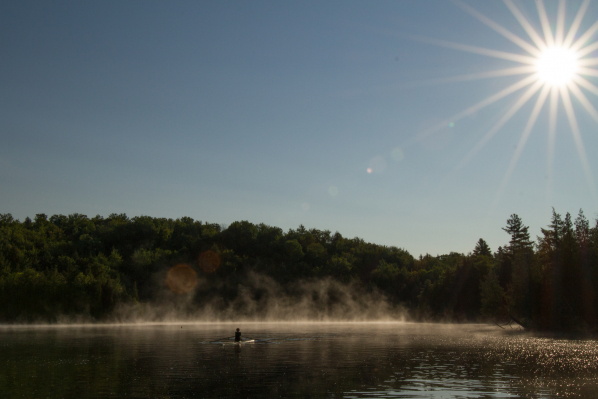
Concept2 has it’s roots in on water rowing. We began building composite oars in 1976, and custom oar building remains a vital part of our business. Our passion for rowing, our pursuit of innovative design for increased performance, and our commitment to customer support have made our oars the preferred choice of top athletes around the world. We take pride in every oar we build for all the rowers in our community. See our video.
